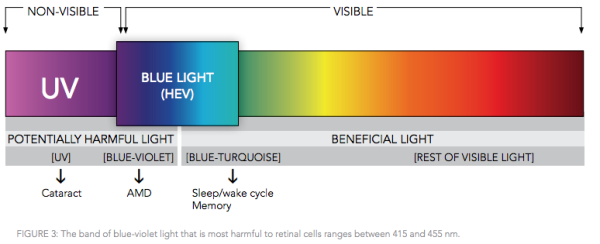
Desktops, laptops, smartphones, reading tablets, televisions, video game consoles. At least 30% of adults spend more than half their waking hours, that’s nine plus hours, using at least one of these devices. 60% of adults spend more than five or more hours every day using some type of glowing screen. For many people, screens are the first thing they look at in the morning and the last thing before bed. Is all this screen time affecting our eye health?
According to the National Institute of Occupational Safety and Health, there is a condition called “computer vision syndrome” (CVS) that affects about 90% of the people who spend three hours or more a day at a computer. Some symptoms include blurred vision, headaches, neck pain, eye redness and dryness, fatigue, dizziness, and difficulty refocusing your eyes. These are the immediate effects, but what about the permanent symptoms?
Are Computer Screens Harming Our Eyes Long-Term?
Computer and tablet screens emit HEV light, aka blue light, that has to the potential to harm our eyes permanently. Blue light is a high-energy wavelength of light that is the reason your eyes get strained. Basically blue light can reach deeper into the eye than ultraviolet light, which may damage the retina.
According to The Vision Council’s report on Digital Eye Strain:
[…] emerging research suggests that this cumulative and constant exposure to blue light can damage retinal cells. This slow degradation could lead to long-term vision problems such as age-related macular degeneration and cataracts.
The retina, which is responsible for processing intensity of light and color, cannot regenerate or be replaced if damaged. Once damage has occurred, the eyes are left increasingly exposed to blue light and other harmful environment factors, increasing the risk for long-term visual impairment.

What Can Be Done Now?
1. Optometrists and ophthalmologists recommend the “20 20 20 rule”. Every 20 mins, focus your eyes on an object 20 feet away for 20 seconds. Or you could close your eyes for 20 seconds every 20 minutes or so. This relaxes the muscles inside and outside the eye, and remoistens the surface of the eyes.
2. A good rule of thumb is to keep your computer screen at least an arm’s length away from your face. When you view something close up, your eyes work harder than when looking at something farther in the distance.
3. Dim your computer or tablet screen. Make the font the same size as your parent’s font if you have to.
4. There are a number of eyeglass lenses and products that help reduce your exposure to blue light when using digital devices. The most popular of these are the Gunners, which help you focus more naturally, causing less eye strain. It also helps reduce glare and prevent dry eyes caused by fluorescent light in your workspace. I have a pair and you can tell a difference within a few weeks of use.
5. Of course “there’s an app for that”. Awareness, available for free for Windows and Mac, is a small timer that lets you know when you should take a break. It also displays how long you’ve been using your computer without taking a break.
6. Lastly, the next time you go to marathon a new show or crush some candy, consider going outside or picking up a (real) book instead.
[divider]
Jared Smith is HostDime’s Content Strategist.
HostDime.com, Inc is a global data center infrastructure provider offering an array of cloud products from managed hosting servers to colocation services that cater to a range of clients, from entry-level to enterprise-level operations. HostDime owns and operates infrastructure and networks in seven countries, with its flagship facility in Florida, USA. Currently with a client base of more than 50,000, HostDime is one of the most reputable data center companies in the world.

I always dim my laptop and all the gadgets I have in the house so my kids and family are safe as well. The 20 20 20 rule is the most effective practice especially if you are at your computer for long hours. Great share Jared!